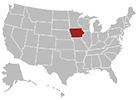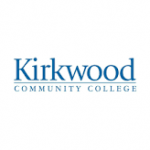
Looking for work that is rewarding, interesting, and financially lucrative?
Becoming a home health aide might be just what you’re looking for.
The process to become a Health Aide in Iowa is affordable and straightforward.
Check out these resources to get you on your way to starting a truly important and fulfilling career doing greatly needed-work.
5 Home Health Aide Schools in Iowa
In order to become a certified health aide, Iowa requires that you complete 75 hours of training as well as 17 hours of clinical work.
Training can be obtained through a number of sources throughout the state, including vocational schools, college programs, and private agencies.
Look through the list below to find the option that makes the most sense for you.
1. Hawkeye Community College

6-week program for $500.00
Address: 1501 East Orange Road, Waterloo, IA 50701
2. Southeastern Community College
![]()
7-week program for $400.00
Address: 1500 West Agency Road, West Burlington, IA 52655
3. Kirkwood Community College

12-week program for $500.00
Address: 6301 Kirkwood Blvd SW, Cedar Rapids, IA 52404
4. Eastern Iowa Community College

16-week program for $400.00
Address: 306 West River Drive, Davenport, IA 52801
5. Indian Hills Community College

16-week program for $400.00
Address: 525 Grandview Avenue, Ottumwa, IA 52501
Home Health Aide Schools in Iowa – Summary Table
Top 5 Schools in Iowa
| School Name | Address |
|---|---|
| Hawkeye Community College | 1501 East Orange Road, Waterloo, IA 50701 |
| Southeastern Community College | 1500 West Agency Road, West Burlington, IA 52655 |
| Kirkwood Community College | 6301 Kirkwood Blvd SW, Cedar Rapids, IA 52404 |
| Eastern Iowa Community College | 306 West River Drive, Davenport, IA 52801 |
| Indian Hills Community College | 525 Grandview Avenue, Ottumwa, IA 52501 |
Home Health Aide Salary
Though there is some cost to training, the return on investment for becoming a certified home health aide might make that initial deposit a bit easier.
On average, home health aides make $25,927 in Iowa and can earn up to as much as $31,326 in certain positions.
Most of the jobs will also include benefits such as health insurance, social security, and paid time off.
Annual Salary Range:Average Salary of Home Health Aides in Iowa
| City Name | Salary |
|---|---|
| Davenport | $26,222 |
| Des Moines | $26,608 |
| Cedar Rapids | $26,142 |
| Sioux City | $23,450 |
| Waterloo | $24,999 |
| Iowa City | $25,927 |
| Council Bluffs | $26,050 |
| Ames | $26,360 |
| Dubuque | $25,934 |
| West Des Moines | $26,608 |
Regional Salary in Iowa
| Region | Employed | Avg. Annual Salary | Avg. Hourly Pay | Top 10% Annual Salary | Bottom 10% Annual Salary |
|---|---|---|---|---|---|
| Ames, IA | 490 | $32,550 | $15.65 | $39,930 | $24,780 |
| Cedar Rapids, IA | 1,860 | $33,690 | $16.2 | $42,330 | $25,850 |
| Davenport-Moline-Rock Island, IA-IL | 2,120 | $30,040 | $14.44 | $38,580 | $23,140 |
| Des Moines-West Des Moines, IA | 4,930 | $32,060 | $15.41 | $39,440 | $24,610 |
| Dubuque, IA | 890 | $34,530 | $16.6 | $43,900 | $28,270 |
| Iowa City, IA | 1,480 | $31,370 | $15.08 | $39,980 | $24,340 |
| Sioux City, IA-NE-SD | 1,100 | $33,030 | $15.88 | $41,800 | $27,640 |
| Waterloo-Cedar Falls, IA | 1,220 | $30,020 | $14.43 | $36,530 | $22,250 |
* Employment conditions in your area may vary.
Frequently Asked Questions
Besides certification, are there any other qualifications I need to have before becoming a home health aide?
Besides the 75 hours of training and 17 hours of clinical work required to receive certification in Iowa, you will also want to keep in mind the following, additional requirements and qualifications to become a home health aide:
- High school diploma or GED
- CPR and First Aid certifications
- Physical capacity: the ability to lean, kneel, squat, and lift heavy objects.
- Schedule flexibility: an ability to work mornings, nights, weekends, or holidays.
- An unrestricted driver’s license, clean driving record, automobile insurance, and a reliable means of transportation.
Is the job demanding?
The job can be both physically and mentally demanding upon a home health aide.
Because your client might have declined physical capacity, it will be your responsibility to lift them, assist them in moving about as needed, as well as picking up anything they might need to be lifted.
You should be comfortable lifting objects of fifty pounds.
Because your client might also have declined cognitive ability, there may be a number of mentally strenuous tasks required by the job.
This may include moments of confusion, disgruntlement, and frustration.
A health aide should be able to keep calm and patient in all circumstances.
Finally, many of your clients may be late in life, and thus experiencing a number of emotional challenges, such as depression, anxiety, and dread.
In many cases, you will be the only person they have to speak to about these things.
It is also possible that you will be faced with other emotionally challenging facets of your job, such as caring for children with severe health issues.
A health aide should be aware of the possibilities and must be emotionally fit enough to provide care and comfort when these challenges arise.
What are the typical duties of a home health aide?
A home health aide will have to complete a wide variety of duties in order to assist their clients, and it can be difficult to list responsibilities, given that everyone’s needs are different.
You should at least expect to complete the following daily tasks while on the job:
- Checking vital signs.
- Administering medication.
- Helping clients with daily tasks as needed, such as cleaning and laundry.
- Physically moving the client from one area to another as needed, such as helping them in and out of the bathtub.
- Shopping for groceries.
- Providing general companionship and quality company.
Is there a difference between being a home health aide and being a certified nursing assistant?
In Iowa, home health aides and certified nursing assistants (CNAs) are both considered to be Direct care workers (DCWs), both of which provide similar services.
The difference between the two is that CNAs require additional training qualifications and only CNAs are eligible to be placed in the Direct Care Worker Registry.
The registry puts CNAs in consideration for longer-term care facilities such as nursing homes, skilled nursing facilities, or a skilled/swing bed unit of a hospital.
If you are considering caregiving as a long-term career choice, achieving CNA certification might be a reasonable option.
What’s the schedule like?
One of the many benefits of becoming a home health aide is schedule flexibility.
Unlike other jobs, there are no set hours and you have the freedom to specify your availability and when it is best for you to work.
Many people with other life obligations such as school, families, or creative passions, gravitate toward this job specifically for this reason.
Of course, the final determination on your schedule will be a matter of finding a situation that works best for both you and the client, you will at least have some say on when you are available to work.




